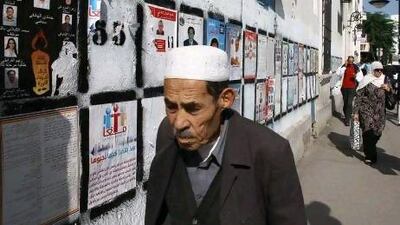Nursing their wounds and looking for lessons after they were comprehensively out-thought, outmanoeuvred and outvoted in parliamentary elections, secularist parties in Egypt and Tunisia say they won't make the same mistakes next time. John Thorne, Foreign Correspondent, reports
TUNIS // Adopt, adapt, improve. That is the plan for North African secularist parties defeated at the polls as they learn from the successful campaign tactics of their Islamist rivals.
Uprisings last year that toppled dictators in Tunisia and Egypt also opened a path to power for Islamists after decades of persecution. Well organised, they swept to electoral victory while fractious secularists struggled for votes.
In Egypt, blocs led by the Muslim Brotherhood's Freedom and Justice Party and the ultraconservative Al Nour Party hold nearly three-quarters of seats in the lower house of parliament. In Tunisia, the moderate Islamist Ennahda party leads a coalition government with two secularist parties. In both countries, Islamists cruised to victory in true democratic style: with a common touch backed by a formidable campaign machine.
The trailblazer was Ennahda, who opened offices nationwide and deployed door-to-door activists to present their pledges to share power with secularists while promoting an open-minded Islamic identity.
That message resonated with Tunisians for whom the aggressive secularism of the dictator Zine El Abidine Ben Ali, with restrictions on Islamic dress and harassment of the overtly religious, had felt like a slap in the face. In elections last October, voters gave 89 of 217 constituent assembly seats to Ennahda and another 49 to two secularist parties who also vowed to bridge the Islamist-secularist divide, while offering a rebuke to secularists who appeared too combative.
"People wanted consensus," says Ahmed Bouazzi, an executive committee member of the Progressive Democratic Party, long-time foes of Ben Ali and a strong second to Ennahda in opinion polls before they slid to fifth place in elections with 16 seats.
One of their mistakes was to heed the advice of campaign consultants to plaster walls with posters of PDP leaders, recalling Ben Ali's once-ubiquitous portraits, Mr Bouazzi says. Another was to run an overtly anti-Ennahda campaign.
Political debate in Tunisia has centred on the country's religious and cultural identity, Mr Bouazzi says. "Ennahda has benefited from this. I think identity will continue to weigh in Arab politics for 10 or 15 years or more."
With that in mind, Mr Bouazzi proposes rewriting the PDP's strategy for parliamentary elections expected late this year.
"We've got to present our programmes as Tunisian programmes with a Tunisian identity: the Arabic language and the Islamic religion," he says. "We should present solutions to economic issues and try to show that the government was not able to solve these issues."
In Egypt, that view is echoed by Ahmed Said, a newly elected MP whose Free Egyptians party performed badly in elections for the country's lower house.
"The lesson we learnt is that we have to reach people in their homes and touch the lives of people like what the Muslim Brotherhood have been doing for decades," Mr Said told The National. "It's not about advertisements on satellite television and billboards."
Created last year by the telecom tycoon Naguib Sawaris, the party is sitting out elections for the Shura Council, Egypt's upper parliamentary house, to focus on next month's presidential race.
With Egypt's new MPs expected to keep their seats for another four years, the party hopes that for now a secularist president could balance the country's Islamist-dominated parliament.
Tunisian secularists, meanwhile, are debating how best to pool forces for the next round of elections. "The great strategic task is to create a broad popular democratic party," says Ahmed Brahim, secretary general of the centre-left Ettajdid party, which had opposed Ben Ali. "Voters need a large political bloc capable of translating their interests into action."
Recent elections in Tunisia and Egypt have pitted long-established Islamist movements against disparate secularist parties mostly founded after last year's uprisings. In Tunisia, those parties are starting to close ranks.
Ettajdid, which had previously called for secularist unity, fought last October's elections as part of the Pôle Démocratique Moderniste grouping and is seeking more allies, while last week nine secular nationalist parties merged to found the Tunisian National Party.
The PDP plans to merge with several parties next month, creating a new party that could have enough seats to rise to second place after Ennahda, Mr Bouazzi says.
It remains to be seen whether a single secularist bloc will eventually take shape. For now, both Mr Brahim and Mr Bouazzi say secularist parties support one another on most big issues.
One such issue is opposition parties' desire for a bigger role in shaping a new Tunisia. According to Mr Brahim, the governing coalition has been quick to assume political offices but slow to start the constituent assembly's main task of drafting a new constitution.
Secularists have also accused the government of failing to discipline Tunisia's small but rambunctious Salafi movement.
Late last month, parties including the PDP backed a protest march in Tunis prompted in part by a disruptive university sit-in by conservative Muslims, an assault last month on two journalists by Salafi protesters, and other stories circulating of Salafi bullying.
Intended to slam authorities for alleged laxity towards rowdy Islamist protesters, the march was also a chance for opposition secularists to flex their muscles.
"This is civil society and political parties coming together to defend a pluralist Tunisia," said PDP secretary general Maya Jribi, who joined the march, over the chants of demonstrators.
Two weeks ago the interim prime minister Hamadi Jebali, from Ennahda, denounced the recent assault by Salafis on journalists. He said the perpetrators would face justice, and reiterated the government's pledge not to exceed one year or so in power.
Secularist parties should use that year to forge alliances, said Mr Brahim. "We need unity. If things continue like they are, the next elections will be a repeat of the last ones."
* With additional reporting by Bradley Hope in Cairo

